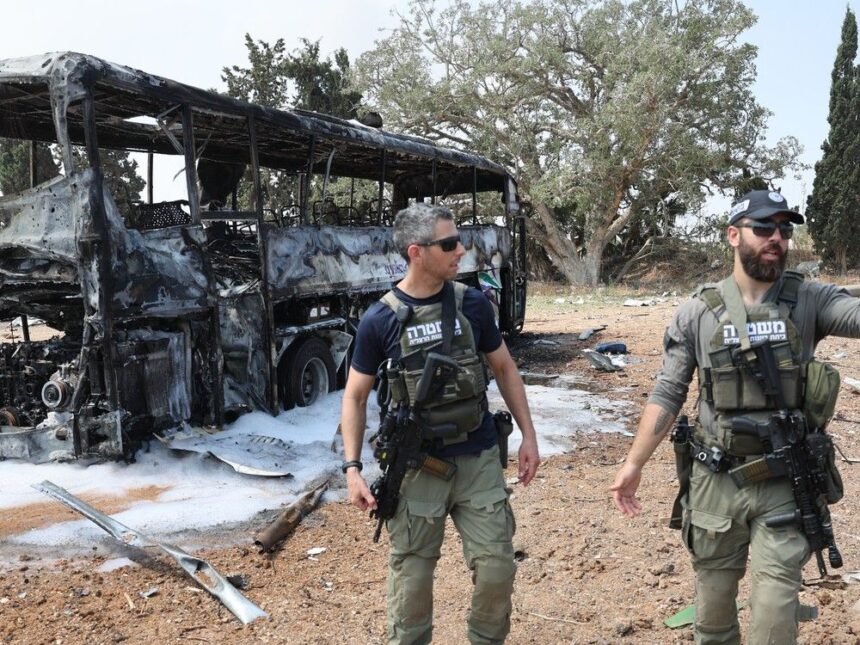As sirens wailed across Israel’s urban centers Tuesday evening, I found myself on a video call with Liora Menachem, a café owner in Tel Aviv, who abruptly disappeared from frame. “We’re going to the shelter now,” she called out, her voice echoing as she descended the stairwell of her apartment building. The connection cut moments later.
Iran had launched what Israeli military officials are calling the most extensive direct attack on the country in its history – over 180 ballistic missiles targeting military bases and intelligence facilities across Israel. The barrage came in two waves starting around 7:30 p.m. local time, lighting up the night sky as Israel’s Iron Dome air defense system engaged incoming projectiles.
“This is different from October,” Menachem told me when she called back thirty minutes later. “Then, we were shocked. Tonight, we were ready.” Like many Israelis, Menachem has kept an emergency bag packed since tensions with Iran escalated following Israel’s strike on Iran’s embassy compound in Damascus earlier this month that killed several Islamic Revolutionary Guard Corps commanders.
The Iranian attack represents a dramatic escalation in the regional conflict that has been spiraling since Hamas’ October 7 assault on Israel. Tehran framed the missile barrage as retaliation for Israel’s killing of Hamas political leader Ismail Haniyeh in Tehran on July 31, as well as the earlier assassination of Hezbollah commander Fuad Shukr in Beirut.
According to Israel’s military spokesperson Rear Admiral Daniel Hagari, despite the volume of missiles, most were intercepted, with “minimal damage to national infrastructure.” At least one civilian death has been reported in the West Bank, and several injuries throughout Israel. The relatively low casualty count speaks to both Israel’s multi-layered defense systems and extensive civil defense preparations.
In Haifa, municipal worker Eli Dahan described the scene at one of the city’s public shelters: “We have everyone here – Orthodox families, secular students, Arab citizens. Fear doesn’t discriminate.” The shelter, designed to accommodate 200 people, held nearly 300 as the attack unfolded.
The Israeli Defense Forces (IDF) had anticipated the attack for weeks, with military officials coordinating with U.S. Central Command to prepare defensive measures. American warships in the region, equipped with advanced interceptor systems, assisted in defending Israeli airspace, according to Pentagon officials speaking on background.
U.S. President Joe Biden convened an emergency meeting with his national security team at the White House as the attack unfolded. In a statement, Biden condemned Iran’s actions while urging restraint on all sides. “The United States is fully supporting Israel’s defense against these attacks,” Biden said, adding that he had directed U.S. military forces to help intercept Iranian missiles.
The economic impact was immediately apparent. Tel Aviv’s stock market tumbled nearly 7% in early trading Wednesday, while global oil prices surged over 4% on fears of a wider regional war that could disrupt Middle Eastern energy supplies. The Israeli shekel weakened to its lowest level against the dollar since November.
“We’re looking at a potential watershed moment in Middle East security architecture,” says Dr. Eliana Marshak, senior fellow at the Institute for National Security Studies in Tel Aviv. “Iran has crossed a significant threshold with direct ballistic missile strikes on Israel proper, breaking its long-standing preference for proxy warfare.”
Israel’s war cabinet, led by Prime Minister Benjamin Netanyahu, convened an emergency session to determine the country’s response. Defense Minister Yoav Gallant promised “consequences that Iran’s regime has yet to experience,” suggesting Israel is weighing significant retaliatory options.
Military analysts suggest Israel could target Iran’s nuclear facilities, oil infrastructure, or military bases – each carrying different levels of risk for regional escalation. “The calculus is incredibly complex,” says former IDF intelligence officer Avi Melamed. “Israel must respond forcefully enough to deter future attacks while avoiding actions that would trigger an all-out regional war.”
In Tehran, Supreme Leader Ayatollah Ali Khamenei appeared on state television praising the missile attack as a “rightful defense of Iran’s sovereignty.” Iranian officials indicated they consider the matter settled unless Israel retaliates.
Meanwhile, international diplomatic efforts have intensified. UN Secretary-General António Guterres called for “maximum restraint” while European leaders urged de-escalation. British Foreign Secretary David Lammy stated that “escalatory actions threaten to engulf the entire region in catastrophic conflict.”
For ordinary Israelis, the attack marks another traumatic chapter in a year defined by conflict. In Jerusalem’s Mahane Yehuda market Wednesday morning, vendors were back at their stalls despite the previous night’s chaos.
“We’ve lived through worse,” said fruit seller Moshe Biton, arranging pomegranates at his stand. “But not knowing what tomorrow brings – that’s the hardest part.“
As Israel’s security cabinet weighs its response options, the broader question looms: can the region pull back from the brink of all-out war, or have both sides crossed a point of no return? The coming days will likely determine whether this missile exchange marks the beginning of a new, more dangerous phase in the long-standing conflict between Israel and Iran.






